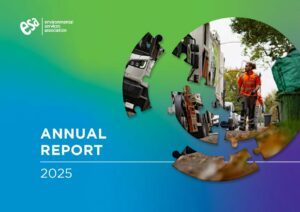ESA Energy and Climate Change policy advisor, Charlotte Rule
We have recently published a report setting out our strategy for the successful application of the Emissions Trading Scheme (ETS) to energy recovery operations.
ESA and its members believe the strategy will maximise the opportunities for successful implementation leading to improved decarbonisation impacts, while avoiding unintended consequences that could see waste materials fall down the waste hierarchy.
While we support the inclusion of energy recovery in the Emissions Trading Scheme, which will contribute to sectoral decarbonisation, like many across the recycling and waste management value chain, we have raised concerns about the potential for unintended consequences that could see waste material return to landfill, be exported elsewhere or fall into the hands of waste criminals.
We have been working with members, through our new ETS Working Group, to develop an approach to the application of the Emissions Trading Scheme (ETS) to EfW facilities that is pragmatic, feasible and equitable, and mitigates the risk of unintended consequences. Government is expected to consult industry stakeholders over the ETS later in 2023 and the ESA’s ETS strategy will inform its response to this consultation.
The strategy document, entitled A sustainable transition into the Emissions Trading Scheme, sets out five priority areas for success. These priority areas include:
- developing a deliverable timetable;
- avoiding unintended consequences;
- developing clear and practical implementation mechanisms;
- ensuring sustainable economic impacts
- incentivising investment in both recycling and carbon capture infrastructure.
Carbon pricing can provide a powerful incentive for net zero investment and support delivery against ambitious recycling targets but it is essential this intervention is applied with the utmost care to avoid any perverse outcomes – most importantly to prevent waste moving down the waste hierarchy to landfill. The reforms also need to complement the implementation of key packaging and recycling policies to drive up recycling rates.
Having spoken with the Chair of the ETS working group, Chris Jonas, he reiterated that a managed transition for ETS will deliver the most effective results and developing a phased approach to implementation, led by key pre-conditions rather than dates, will ensure compliance, reduce unintended consequences, and increase investment in green circular technologies.




